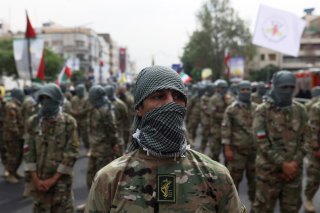Wagner Group and the IRGC: The Rise of Self-Sustaining Military Proxies
The use of self-sustaining fighting groups appeals to certain states, because they allow them to impose greater losses and costs on their enemies and alter global order.
But the make-up of the Wagner forces is distinct from Russian forces. Wagner's military recruiters draw largely from prisons. As of this writing, roughly 50,000 Wagner fighters are in Ukraine: 10,000 are “traditional” mercenary contractors, while 40,000 are convicts. Wagner publicly ended this practice on February 8 of this year.
The Treasury Department’s designation of the Wagner’s as a “transnational criminal organization” (TCO) is a significant step toward exposing greater Wagner atrocities. Transnational criminal organizations threaten U.S. interests through diversified criminal activities. Violence and corruption are at the heart of TCOs and how they conduct their illicit activities.
It is an open question as to whether or not Wagner is trying to outshine and even outlast the Russian state military. Continued sanctions hurt, and continuing exposures of direct ties to the Kremlin make it easier to impose more effective sanctions. It’s improbable that Wagner will create a shadow government as the IRGC have done in Iran, but they can become self-sustaining to such a degree as to offer Moscow parallel militaries to achieve its geostrategic ambitions counter to NATO and abroad in the most vulnerable parts of Africa. While the Kremlin writ large is not altogether supportive of Wagner (or Prigozhin for that matter), the group has Putin’s support—unless Putin changes his perspective on his old friend.
A Future of Private Military Groups?
Institutions like the IRGC and Wagner are tools of foreign policy by their respective states. Ever opportunistic, these states look to expand their influence in global hotspots where the United States is minimally present, taking advantage of the fact that Washington is focused is on higher-priority issues elsewhere. When a foothold is established, front and shell companies are propped up to enable illicit activities and evade sanctions. In the Wagner case, African countries are strategic access points for a regional presence that could assist Moscow’s economy through the impact and re-export of globally banned items due to sanctions. While Iraq was a political and military access point for Iran’s IRGC, African countries offer commercial activities that support Moscow, and could potentially lengthen the war in Ukraine.
For years, Prigozhin and his group went unnoticed, wreaking havoc in unstable environments while eluding the attention of the international community. Then, again, the world didn’t see the rise of the IRGC coming either. With the ongoing war in Ukraine, it’s essential to set our sights on Wagner before it becomes too powerful to scale back.
Alma Keshavarz is a visiting professor in international relations at Pepperdine University, School of Public Policy. She previously served in the Secretary of State’s Policy Planning Staff at the Department of State.
Kiron K. Skinner is the Taube Professor of International Relations and Politics at Pepperdine University’s School of Public Policy, W. Glenn Campbell Research Fellow at Stanford University’s Hoover Institution, and a Visiting Fellow at the Heritage Foundation.
Image: Shutterstock.

